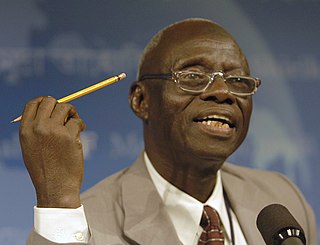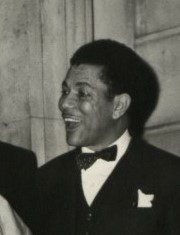
Chief Obafemi Jeremiah Oyeniyi Awolowo was a Nigerian nationalist and statesman who played a key role in Nigeria's independence movement (1957–1960). Awolowo founded the Yoruba nationalist group Egbe Omo Oduduwa, and was the first Leader of Government Business and Minister of Local Government and Finance, and first Premier of the Western Region under Nigeria's parliamentary system, from 1952 to 1959. He was the official opposition leader in the federal parliament to the Balewa government from 1959 to 1963.

The president of the Federal Republic of Nigeria is the head of state and head of government of the Federal Republic of Nigeria. The president directs the executive branch of the federal government and is the commander-in-chief of the Nigerian Armed Forces.

Shehu Usman Aliyu Shagari was a Nigerian politician who was the first democratically elected president of Nigeria, after the transfer of power by military head of state General Olusegun Obasanjo in 1979 giving rise to the Second Nigerian Republic.

SokotoState is one of the 36 states of Nigeria, located in the extreme northwest of the country. Bounded by Republic of the Niger to the north and west for 363 km, and the states of Zamfara to the east, and Kebbi to the south and west, partly across the Ka River. Its capital and largest city is the city of Sokoto. Sokoto is located near to the confluence of the Sokoto River and the Rima River. As of 2022 it has an estimated population of more than 6.3 million.

The National Party of Nigeria (NPN) was the dominant political party in Nigeria during the Second Republic (1979–1983).

Chuba Wilberforce Okadigbo, was a Nigerian politician, philosopher, academic, writer and political scientist. He served as the 8th president of the Nigerian Senate from 1999 to 2000. Sometimes referred to as Oyi of Oyi in reference to his local government council area (Oyi), he held numerous political positions in the Nigeria government and was known to have opposed the then ruling Peoples Democratic Party, which was led by President Olusegun Obasanjo.

Adamu Ciroma was a Nigerian politician and Governor of the Central Bank of Nigeria, born to a Bole family in Potiskum, Yobe State. He was a member of the People's Democratic Party.

The Second Nigerian Republic was a brief formation of the Nigerian state which succeeded the military governments formed after the overthrow of the first republic.

Chief Arthur Edward Prest was an Itsekiri politician of biracial heritage from the Warri division of southern Nigeria.
Barrister Mukhtar Shehu Shagari, CFR was appointed Nigerian Minister of Water Resources in a June 2001 reshuffle of the cabinet of President Olusegun Obasanjo. He was later appointed President of the African Ministers Council On Water (AMCOW). Shagari held office until January 2007 when he left to compete for Deputy Governor of Sokoto State. He was elected Deputy Governor of Sokoto State in April 2007, and after a legal challenge was reelected in May 2008.
Michael Ani was chairman of the Federal Electoral Commission (FEDECO) established by General Olusegun Obasanjo to conduct elections leading to the Nigerian Second Republic, which was inaugurated on 1 October 1979. He held office from 1976 to 1979.
Chief Atanda Fatai Williams, was a Nigerian Jurist and Chief Justice of Nigeria from 1979 to 1983.

The Awolowo v. Shagari case was a lawsuit between Chief Obafemi Awolowo and Alhaji Shehu Shagari in which Chief Obafemi Awolowo's petition challenged the declaration of Shehu Shagari as the president elect of the 11 August 1979, presidential election.

Chief Godwin Olusegun Kolawole Ajayi, SAN popularly known by his initials GOK Ajayi, was a prominent Nigerian lawyer.
Chief Samuel Obakayode "Kayode" Eso, CON, CFR was a prominent Nigerian jurist. He served as a Justice of the Supreme Court of Nigeria.

The Cabinet of Shehu Shagari formed the government of Nigeria during the presidency of Shehu Shagari between 1979 and 1983, after the return to civilian rule with the Second Nigerian Republic. Among the cabinet Ministers are Adamu Ciroma, Bello Maitama Yusuf, Mamman Ali Makele etc. It was terminated by a military coup.

Bello Shagari (born 26 April 1988) is a youth activist and a documentary filmmaker. He is the representative of Non-Aligned Movement Youth Organization in Nigeria (NAMYO). Prior to that, he led the National Youth Council of Nigeria and The Royal African Young Leadership Forum,.
Alhaji Abubakar Garba Koko,, Sarkin Yakin Gwandu,, was a Nigerian civil servant, Administrator, and Politician who served as the first Executive Secretary of the Federal Capital Development Authority (FCDA), Abuja. He planned and executed the development of Nigeria's new federal capital in the 80s.
The 1983 Sokoto State gubernatorial election occurred on August 13, 1983. NPN candidate Garba Nadama won the election.














